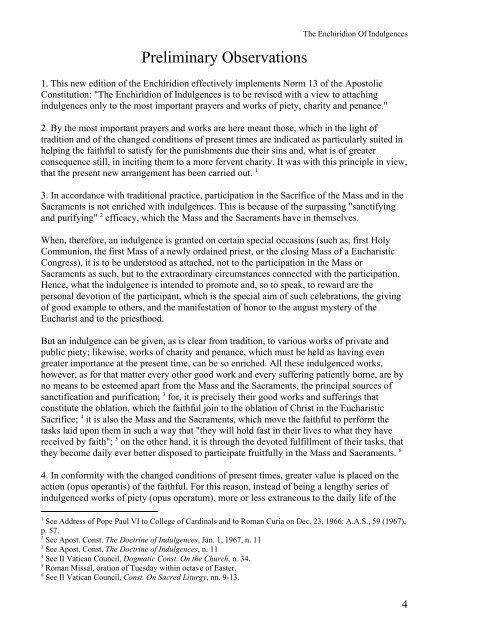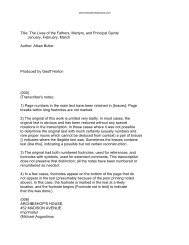The Enchiridion Of Indulgences - St. Patrick's Basilica
The Enchiridion Of Indulgences - St. Patrick's Basilica
The Enchiridion Of Indulgences - St. Patrick's Basilica
Create successful ePaper yourself
Turn your PDF publications into a flip-book with our unique Google optimized e-Paper software.
Preliminary Observations<br />
<strong>The</strong> <strong>Enchiridion</strong> <strong>Of</strong> <strong>Indulgences</strong><br />
1. This new edition of the <strong>Enchiridion</strong> effectively implements Norm 13 of the Apostolic<br />
Constitution: "<strong>The</strong> <strong>Enchiridion</strong> of <strong>Indulgences</strong> is to be revised with a view to attaching<br />
indulgences only to the most important prayers and works of piety, charity and penance."<br />
2. By the most important prayers and works are here meant those, which in the light of<br />
tradition and of the changed conditions of present times are indicated as particularly suited in<br />
helping the faithful to satisfy for the punishments due their sins and, what is of greater<br />
consequence still, in inciting them to a more fervent charity. It was with this principle in view,<br />
that the present new arrangement has been carried out. 1<br />
3. In accordance with traditional practice, participation in the Sacrifice of the Mass and in the<br />
Sacraments is not enriched with indulgences. This is because of the surpassing "sanctifying<br />
and purifying" 2 efficacy, which the Mass and the Sacraments have in themselves.<br />
When, therefore, an indulgence is granted on certain special occasions (such as, first Holy<br />
Communion, the first Mass of a newly ordained priest, or the closing Mass of a Eucharistic<br />
Congress), it is to be understood as attached, not to the participation in the Mass or<br />
Sacraments as such, but to the extraordinary circumstances connected with the participation.<br />
Hence, what the indulgence is intended to promote and, so to speak, to reward are the<br />
personal devotion of the participant, which is the special aim of such celebrations, the giving<br />
of good example to others, and the manifestation of honor to the august mystery of the<br />
Eucharist and to the priesthood.<br />
But an indulgence can be given, as is clear from tradition, to various works of private and<br />
public piety; likewise, works of charity and penance, which must be held as having even<br />
greater importance at the present time, can be so enriched. All these indulgenced works,<br />
however, as for that matter every other good work and every suffering patiently borne, are by<br />
no means to be esteemed apart from the Mass and the Sacraments, the principal sources of<br />
sanctification and purification; 3 for, it is precisely their good works and sufferings that<br />
constitute the oblation, which the faithful join to the oblation of Christ in the Eucharistic<br />
Sacrifice; 4 it is also the Mass and the Sacraments, which move the faithful to perform the<br />
tasks laid upon them in such a way that "they will hold fast in their lives to what they have<br />
received by faith"; 5 on the other hand, it is through the devoted fulfillment of their tasks, that<br />
they become daily ever better disposed to participate fruitfully in the Mass and Sacraments. 6<br />
4. In conformity with the changed conditions of present times, greater value is placed on the<br />
action (opus operantis) of the faithful. For this reason, instead of being a lengthy series of<br />
indulgenced works of piety (opus operatum), more or less extraneous to the daily life of the<br />
1 See Address of Pope Paul VI to College of Cardinals and to Roman Curia on Dec. 23, 1966: A.A.S., 59 (1967),<br />
p. 57.<br />
2 See Apost. Const. <strong>The</strong> Doctrine of <strong>Indulgences</strong>, Jan. 1, 1967, n. 11<br />
3 See Apost. Const. <strong>The</strong> Doctrine of <strong>Indulgences</strong>, n. 11<br />
4 See II Vatican Council, Dogmatic Const. On the Church, n. 34.<br />
5 Roman Missal, oration of Tuesday within octave of Easter.<br />
6 See II Vatican Council, Const. On Sacred Liturgy, nn. 9-13.<br />
4






